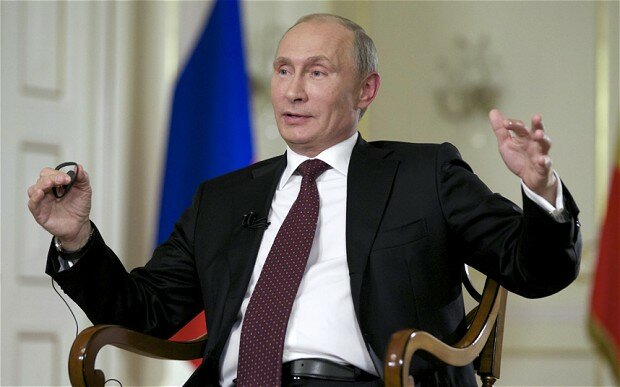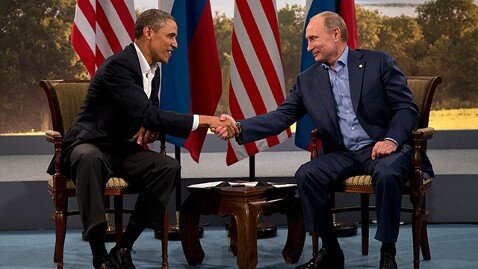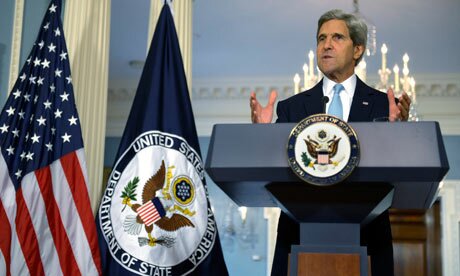This week, leaders of the world’s most important countries traveled to St. Petersburg, Russia, for the eighth biannual G-20 meeting – ostensibly an opportunity for a discussion of global financial and economic matters, but there has been an “elephant” in the room this time around. A massive, bloody, chemical weapon-ravaged “elephant” called Syria. President Barack Obama, backed by Secretary of State John Kerry, has made clear in the past fortnight his intentions to order military action against Syria, or more accurately, the regime of President Bashar al-Assad. Mr. Assad, whose family has ruled Syria since 1971, has been embroiled in a civil war against various rebel groups since early 2011 – the dawn of the Arab Spring. It has been alleged, and then proven, that Mr. Assad ordered the use of chemical weapons against his citizenry on August 21st 2013, and many times before. The August 21st incident was a shelling of Eastern Ghouta, a suburb in eastern Syria, which killed over 350 people instantly and injured around 3,600. The death toll could now be as high as 1,500. There is little doubt that the Syrian government is responsible. The Syrian military (loyal to Mr. Assad) holds the third-largest inventory of chemical weapons in the world -over 1,000 tons of chemical weapons, including the deadly nerve gas Sarin, which was believed to have been used in the aforementioned shelling. Chemical weapons, the reason of which we shall get to later, have been outlawed in warfare since the 1928 Geneva Protocol, an international agreement on the rules of warfare.
On August 20th 2012, Mr. Obama drew a red line for the world. He stated the use of chemical weapons in Syria would result in American military intervention. There has been proof from U.S. intelligence services that Mr. Assad has ordered chemical attacks as early as the beginning of this year, yet Mr. Obama has waffled and blustered on about “legal proof.” Now, faced with incontrovertible evidence, he has backed himself into a corner. Unfortunately, that isn’t the only problem. In a situation like this, America can usually come out swinging with the general backing of the international community. There will be no backing this time. Mr. Obama faces severe backlash from the majority of the UN, most notably a nemesis who has come to enjoy significant success defying him in recent times – the Russian president, Vladimir Putin.

Via: i.telegraph.co.uk.com
While there have been no “official” debates at the G-20, multiple backroom discussions have taken place on the Syria dilemma. Mr. Obama and Mr. Putin’s talk, while he called it friendly and thorough, did not end well for Mr. Obama. On the contrary, Mr. Putin, who has been the main opponent of military action against Mr. Assad’s regime, has stated his belief that the Syrian rebels were responsible for the chemical attacks, that his country will continue to send humanitarian aid to the Syrian government, and that any missile attack from the United States will be met with a Russian response.
For the novice, it’s difficult to see why Mr. Putin is so firmly behind Mr. Assad. Syria, while in the Middle East, has little in the way of oil or other natural resources. Its territory has no strategic value. Iran, along with the terroristic, Islamist militia Hezbollah, is Syria’s main backer – no-one wants to be seen as Iran’s ally. What’s the point? Well, the benefit is threefold.
First, within its borders Russia is struggling. Mr. Putin has been in charge since 1999, and while he has been democratically elected four times, the last election was suspicious and he has assumed a strongman persona. Criticism of the government in the press or during political campaigns can land a man in jail, as Alexei Navalny and Mikhail Khodorkovsky can testify. Despite all this, the Russian people have generally viewed Putin as a strongman they can deal with. After all, democracy in Russia before Putin was an unmitigated disaster, and the Ruskies have always had an affinity for leaders with a dictatorial bent. However, this attitude will only last for as long as bread, electricity, jobs, and vodka are plentiful. This is not the case. The Russian economy has been sinking since 2007, and Putin needs to put himself above events back home if he is to maintain popularity among the proletariat. Standing up to America, long the “evil one” in Russian history books, is sure to curry favor.
Second, Russia is not alone in opposing military action in Syria. Over half of the G-20 has come out against Mr. Obama’s plan. Only France, led by socialist President Francois Hollande, has backed a missile strike against Mr. Assad’s regime. Anyone with a basic history of war can imagine how frightened Mr. Assad must be at the prospect of facing France. While most nations oppose, a few vacillate; both condemning use of chemical warfare and opposing a military strike. For example, look at Great Britain. Prime Minster David Cameron had been among the first to suggest military action, continuing a proud tradition of British leaders bending over whenever America orders them to assume the position (can we ever hope for this again?). Surprisingly, when the decision to intervene militarily was put to the House of Commons, the motion was narrowly defeated in a combination of political games from opposition leader, Ed Miliband, a fear of repeating the mistakes made in rushing into Afghanistan, and the potential cost of entering another drawn-out Middle East conflict at a time when the British economy is precariously positioned between recovery and recession. A blow for Mr. Cameron, and indeed for Mr. Obama. Mr. Kerry petulantly lashed out against the decision, pointedly snubbing Britain when describing the French as “America’s oldest ally .” With the scales tipping towards staying out of the Syrian conflict altogether, Mr. Putin has an opportunity to ingratiate himself with other world leaders and further sully America’s reputation as a force to be reckoned with. He is taking it with both hands.
Third, Mr. Putin has been winning the foreign policy battles with Mr. Obama since day one. A nuclear treaty (New START) which greatly weakened American resources while barely making a dent in Russia’s own capabilities. Russian espionage within the U.S. has reached Cold War levels, without reciprocation. Mr. Putin has made much more headway with China than Mr. Obama has been able to, setting up a partnership which the West has reason to be very anxious about. And, of course, the Edward Snowden debacle. Mr. Putin has outmaneuvered Mr. Obama at every turn. He is doing the same today. And he loves every second of it.

Smiling on the outside, scheming on the inside. Via: a.abcnews.com
Do you want to know what Mr. Obama’s biggest mistake has been with Syria? He waited too long. Look at this timeline: civil war broke out in Syria in April 2011; Mr. Obama says ,“For the sake of the Syrian people, the time has come for President Assad to step aside,” in August 2011; a year later, he draws his red line; another year later, he finally decides to intervene after months of indecision. Why the wait? Why not intervene in July 2012? Rebels had taken cities in the north and west and were mounting attacks to take Damascus and Aleppo. If the U.S. had lent military assistance to the moderate rebels at that time, we could have ended the war then, or at least brought Mr. Assad to the bargaining table. But no, Mr. Obama chose to twiddle his thumbs while the rebels lost their strongholds and allowed themselves to be infiltrated and influenced by al-Qaeda militants.
This is yet another worry, one voiced repeatedly by Mr. Putin and other opponents of intervention. If the U.S. chooses to give aid, military or otherwise, it will be indirectly helping the organization responsible for 9-11, as well as other Muslim extremists. ISIS (Islamic State in Iraq and Syria, not to be confused with the website where you check your schedule) is the most extreme group out there, espousing an extreme Sunni Muslim philosophy faithful to the tenets of al-Qaeda. One of its foot soldiers, Abu Sakkar, made headlines around the world when a video emerged of him eating an enemy soldier’s heart (warning, this video is not for the faint-hearted).Unfortunately, it is one of the three most influential groups. Another is the Syrian Islamist Front bloc, groups of anti-democracy Salafi Muslims allied with the Ahrar al-Sham militia, the most influential fighters against Mr. Assad. The third, and the group Mr. Obama desires to ally himself with, is the Syrian Islamic Liberation Front, led by former Syrian army major Salim Idriss. Again a Sunni Muslim group, the SILF has allegiances with the Muslim Brotherhood, which was just turfed out in Egypt in the precipitation of yet another civil war. All in all, not exactly the kind of fellows you want on your team.
Mr. Kerry, in yet another bafflingly idiotic statement, said that rebels in Syria “have increasingly become more defined by moderation, more defined by the breadth of membership, and more defined by adherence to some, you know, democratic process and to an all-inclusive, minority-protecting constitution.” This is nonsense. Every intelligence report out there indicates that groups like ISIS and al-Qaeda-aligned Nursa Front are better armed and better organized than groups which the West would like to be aligned with. Such foolishness plays into the hands of Russia and other opposing powers. Indeed, Mr. Putin himself called Mr. Kerry a liar – not a rare moment in diplomacy, but when such a statement is directed to the world’s press, it is a major show of disrespect. A State Department spokeswoman defended Mr. Kerry’s statement, coming out with some puerile rubbish about Mr. Kerry, an army veteran, “having had more than words aimed at him.” Jesus Christ…

Send in the clown. Via: static.guim.co.uk.com
Before we wrap things up here, a quick aside on chemical warfare. A question may have occurred to you if you have been following this – why are chemical warfare illegal when nuclear warheads, Trident missiles, and tanks are not? What is the moral difference between killing a village of civilians with Sarin gas and killing a village of civilians with soldiers carrying M-60 rifles? War is war, death is death. Why the moral objection to chemical warfare? Winston Churchill wanted to use poison gas on the Germans in Ypres in 1944. You may recall that even the Americans bombarded the Vietnam jungle with Agent Orange and other chemicals during the Vietnam War (or did your AP History course skip that part?). Interestingly, after they were used against him in World War I, Adolf Hitler ordered that chemical weapons never be used by the German army; a policy which if reversed may have greatly affected the invasion of Normandy. The fact is, there is no good reason to single out chemical warfare as a nefarious means of killing people. It could be that the West does not want terrorists to get a hold of weapons which could bring untold death and destruction to cities across the globe. Perhaps, but it still seems like subjective squeamishness this side of the table.
The question remains, what to do? I stand by my statement that Mr. Obama waited too long. Now that Mr. Assad’s forces have regained the upper hand in the war, there is no quick way of getting him out of power. The plan, as it stands, seems to be to employ a short, sharp series of missile strikes against Syrian military strongholds where chemical weapons are stored. Faced with such devastation, and the leveling of the playing field, Mr. Assad will have no choice but to come to the negotiation table. Well, that sounds alright…except that Mr. Obama told the world the exact details of that plan in an absurd show of transparency, allowing the Syrians to move their weapons from the locations it took U.S. intelligence months to discover. Now, thanks to Mr. Obama’s inability to keep his mouth shut at a podium, that plan doesn’t seem to hold water. One missile attack will do nothing to quell the tide of deaths in this civil war, a toll which has passed the 100,000 mark. There seems to be only two options – do nothing, or invade á la Kuwait. Again, what to do?
Every logical analysis I think of leads me to side with the former, to do nothing. The world is against an invasion. The country (judging by recent polls) is against an invasion. Even Mr. Obama is against an invasion. Getting involved in yet another Middle Eastern war will cost untold billions, enrage the Iranians, and further taint America’s global reputation. In many parts of the world, America is viewed as a neoconservative cowboy who uses humanitarian excuses to rid the world of regimes it doesn’t like. This is not a reputation to be proud of. In a post-Cold War world, it is important to be able to use diplomacy rather than military strength in such matters.
At the same time… the president of the United States drew a red line. It may have been drawn for the wrong reasons, but it was drawn. The second that America does not back up the threat of military aggression in the face of continued defiance is the second that America loses the battle in the Middle East for good. Israel would be gone. Jordan would be back in the hands of Iran. The region would descend into religious extremism, essentially wasting trillions of dollars and thousands of American and British lives.
Machiavelli tells us that it is better to be feared than to be loved. Clearly, America is not loved in the Middle East, but the despots over there fear its military capabilities. If America does not back up its word here, then the results could be dire for American allies in the region. The best thing to do is take action, but not quite yet. Give diplomacy a try for now. The majority of the United Nations must support intervention before it takes place. Otherwise, Putin will have no fear in stopping the missile strikes, Iran will have no fear in attacking Syrian rebels, and Mr. Assad will have no fear in continuing to murder the citizens of his country.
It is a bloody hard situation to deal with. I have no idea how it is going to play out. What I do know is that, if handled badly, this could start a third world war. The way things are now, with America on one side and Russia on the other side is eerily similar to the start of other great wars. I hope that this powder keg is diffused the right way.
I hope.
Photo courtesy of: Huffpost.com





